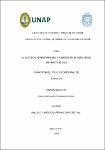| dc.contributor.advisor | Arévalo Sánchez, Billy Jackson | |
| dc.contributor.author | Casana Isern, Eduardo Javier | |
| dc.date.accessioned | 2024-04-08T17:35:46Z | |
| dc.date.available | 2024-04-08T17:35:46Z | |
| dc.date.issued | 2023 | |
| dc.identifier.other | 346.052 C28 2023 | |
| dc.identifier.uri | https://hdl.handle.net/20.500.12737/10007 | |
| dc.description.abstract | The present investigation was carried out with the purpose of addressing the problem of informality in terms of the possession of real estate in Peru. Once the problem was identified, the qualitative research method was chosen, with a practical action research design. The historical development of civil law institutions, such as possession, succession and acquisitive prescription of ownership, was analyzed. Savigny's subjective theory of possession and Ihering's objective theory of possession were analyzed. Likewise, we proceeded to analyze the development and evolution of possession through the civil codes promulgated in Peru. An analysis of law compared to the regulatory framework of Spain, France and Chile was also carried out. Of which legal figures were found as a result that validate the idea that possession can be acquired by succession, and these figures are civil possession (Spain) and possession saisine (France). Lastly, the main judicial resolutions were analyzed, in their different hierarchies, which recognize and/or point out the possibility that possession can be inherited. In conclusion, the hypothesis that possession can be inherited was confirmed, it is recommended to regulate this figure in Peruvian regulations and a bill is presented that can provide a solution to the problem encountered and that regulates the hereditary succession of possession in Peru. | en_US |
| dc.description.abstract | La presente investigación se realizó con la finalidad de abordar el problema de la informalidad en cuanto a la posesión de bienes inmuebles en el Perú. Una vez identificado el problema, se eligió como método el de investigación cualitativa, con un diseño de investigación acción de tipo práctico. Se analizó el desarrollo histórico de las instituciones del derecho civil, tales como la posesión, la sucesión y la prescripción adquisitiva de dominio. Se analizó la teoría subjetiva de la posesión de Savigny y la teoría objetiva de la posesión de Ihering. Así mismo, se procedió a analizar el desarrollo y evolución de la posesión a través de los Códigos civiles promulgados en el Perú. También se realizó un análisis de derecho comparado al marco normativo de España, Francia y Chile. De los cuales se encontraron como resultado figuras jurídicas que convalidan la idea de que la posesión pueda adquirirse por sucesión, y estas figuras son la posesión civilísima (España) y la saisine de la posesión (Francia). Por último, se analizaron las principales resoluciones judiciales, en sus diferentes jerarquías, que reconocen y/o señalan la posibilidad de que pueda heredarse la posesión. En conclusión, se confirmó la hipótesis de que se puede heredar la posesión, se recomienda regular esta figura en la normativa peruana y se presenta un proyecto de ley que puede aportar una solución al problema encontrado y que regula la sucesión hereditaria de la posesión en el Perú. | es_PE |
| dc.format | application/pdf | es_PE |
| dc.language.iso | spa | es_PE |
| dc.publisher | Universidad Nacional de la Amazonía Peruana | es_PE |
| dc.rights | info:eu-repo/semantics/openAccess | * |
| dc.rights.uri | https://creativecommons.org/licenses/by/4.0/ | * |
| dc.subject | Sucesiones | es_PE |
| dc.subject | Herencia | es_PE |
| dc.subject | Sucesión testamentaria | es_PE |
| dc.subject | Posesión | es_PE |
| dc.subject | Prescripción adquisitiva | es_PE |
| dc.subject | Bienes inmuebles | es_PE |
| dc.title | La sucesión hereditaria de la posesión en el Perú desde 1984 hasta el 2022 | es_PE |
| dc.type | info:eu-repo/semantics/bachelorThesis | es_PE |
| thesis.degree.discipline | Derecho y Ciencias Políticas | es_PE |
| thesis.degree.grantor | Universidad Nacional de la Amazonía Peruana. Facultad de Derecho y Ciencias Políticas | es_PE |
| thesis.degree.name | Abogado(a) | es_PE |
| dc.subject.ocde | https://purl.org/pe-repo/ocde/ford#5.05.01 | es_PE |
| renati.author.dni | 71838461 | |
| renati.advisor.orcid | https://orcid.org/0000-0003-2753-8954 | |
| renati.advisor.dni | 41800698 | |
| renati.type | https://purl.org/pe-repo/renati/type#tesis | es_PE |
| renati.discipline | 421056 | es_PE |
| renati.level | https://purl.org/pe-repo/renati/level#tituloProfesional | es_PE |
| renati.juror | Quevedo Guevara, Raúl | |
| renati.juror | Meza Carrizales, Aníbal Rafael | |
| renati.juror | Zubiaurr Traverso, Luis Daniel | |
| dc.publisher.country | PE | es_PE |





